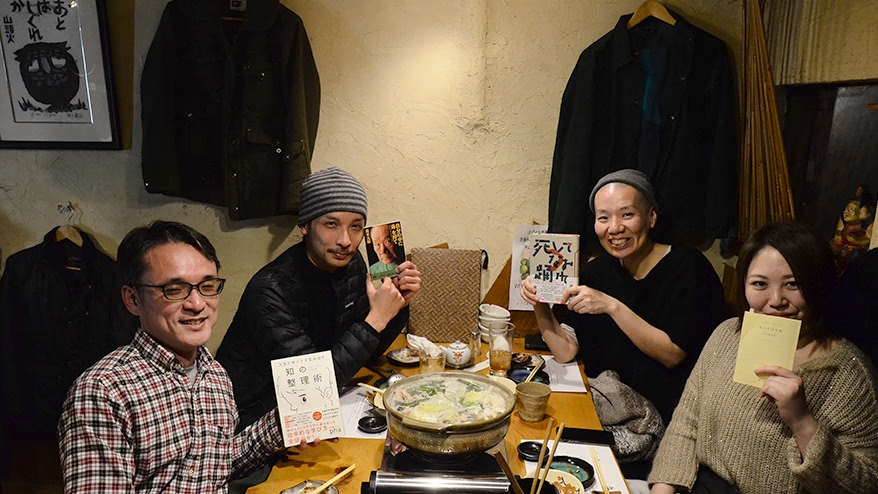年明けの慌ただしさもひと息ついた1月下旬、今年初の読書会が開催されました。テーマは「新しい年に読みたい本」。4人のメンバーがおすすめの本を持ち寄りました。
新年会ということで、外に飛び出したメンバーたち。会場はもちろん、代々木が誇る名店『淡水研究室』です。スペシャルなご馳走を前に、胃袋も準備万端。大将、今年もお世話になります!
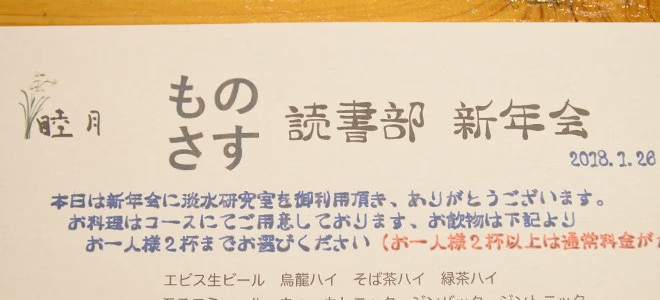
乾杯とともに、読書会スタートです。
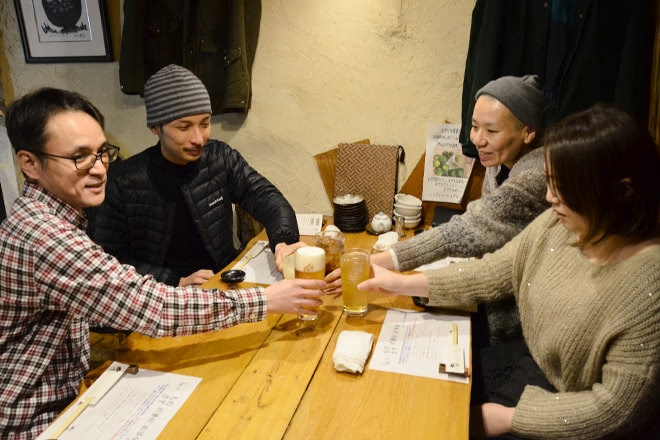
事前に本を読んできて、ひとり5分間で本を紹介します。
(発表の合間に、淡水の美味しい料理も紹介しますよー)
お通し「松前漬けとたらこと大根の煮物」
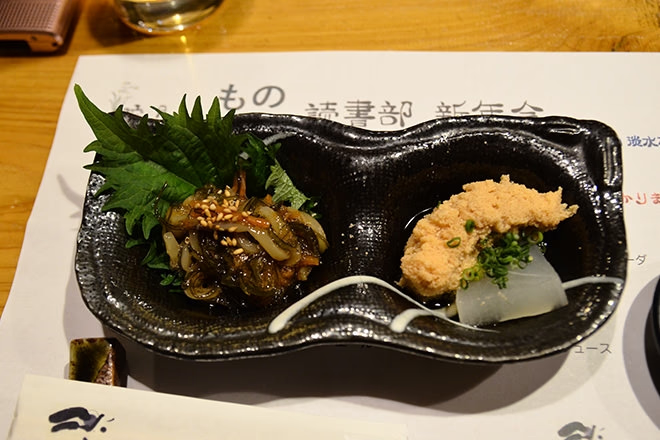
お通しをつまみながら、徐々にテンションが上がります。
「三種類の大根をつかったフードハブのお野菜サラダ」
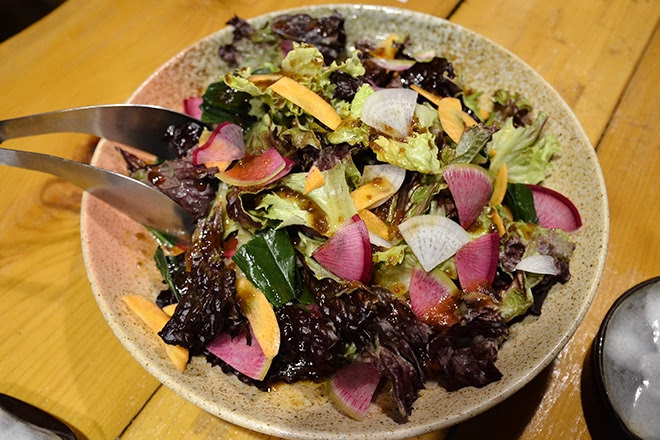
続いて、フードハブ・プロジェクトの野菜を使ったサラダ。歯ごたえが良くて美味しい!
それでは、発表タイムスタート!
今回紹介する本
- 『死してなお踊れ:一遍上人伝』 栗原 康(著)河出書房新社
- 『自分の中に毒を持て』 岡本 太郎(著)青春出版社
- 『人生にゆとりを生み出す 知の整理術』 pha(著)大和書房
- 『私の生活技術』 アンドレ・モーロワ(著)土曜社
捨てろ、捨てろ、やっちまいな
『死してなお踊れ:一遍上人伝』(紹介者 和田 亜也)
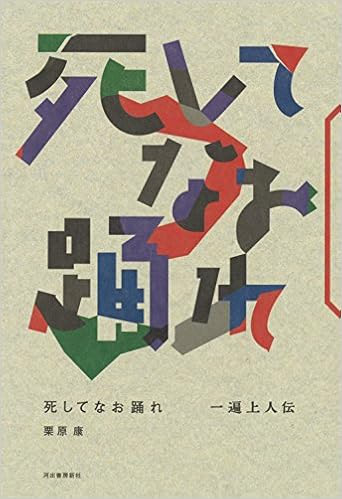
栗原 康 (著)『死してなお踊れ:一遍上人伝』河出書房新社 (2017/1/27) ( Amazon )
-
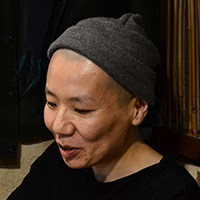 和田
和田 -
昨年読んだ本の中でトップレベルに面白かった『死してなお踊れ』です。鎌倉時代の一遍上人を描いた評伝ですが、新しい年にあたって、また読みたいと思って持ってきました。
一遍上人といえば「踊り念仏」と歴史の教科書で覚えましたが、当時から「踊り念仏って何だ?」って思ってたんです。で、この本を手にとったらめちゃくちゃ面白くて。生い立ちから踊り念仏にいたるまで順を追いながら、すごく読みやすい文体で描かれてます。
一遍は「仏教とは、捨ててこそ」と、家族も財産も捨てて出家するんです。すると妻子がついてきて一緒に出家しちゃう。じゃあ皆で行くかと旅するうちに、どんどん仲間が増えて大所帯になる。普通はそこで組織になると思うんですが、彼は上下関係やヒエラルキーを嫌って、組織をつくらず寺を持たず、踊り念仏とともに生涯各地を行脚しつづけたんです。
女性や子ども、病人もわけへだてせず、寄付の大小や念仏の回数でご利益に差がつくのはおかしいと、従来の仏教の枠を踊り念仏で壊していくんですよね。本の中のタイトルも面白くて「捨てろ、捨てろ、やっちまいな」とか(笑)。
体ひとつで、何にもとらわれず生きる姿がすごくいいなぁと思って。私も部署異動して、今年は新しいチャレンジが増えると思うんですけど、考えすぎずにシンプルにやっていきたいなと。そんな背中を押してくれる一冊です。
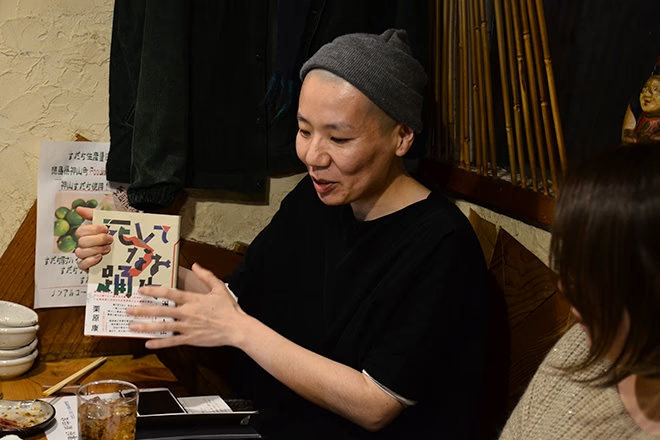
-
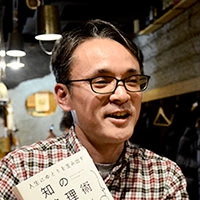 村上
村上 -
宗派は何ですか?お寺も無いのに、今も教えが残ってるってスゴイですね。
-
 和田
和田 -
「時宗」ですね、亡くなったあとにお弟子さんが付けたそうです。
-
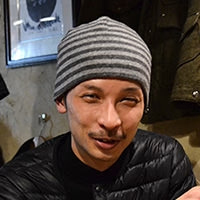 羽賀
羽賀 -
著者は研究者の方なんですか?
-
 和田
和田 -
本業は政治学者でアナーキスト? 京都で空也上人像(一遍にも影響を与えた平安時代の僧)を見て涙がでるほど感動して、そこから一遍にも興味を持ったとか。「自分が思うように生きる」という姿勢に共感したんじゃないかな。
「お造り」
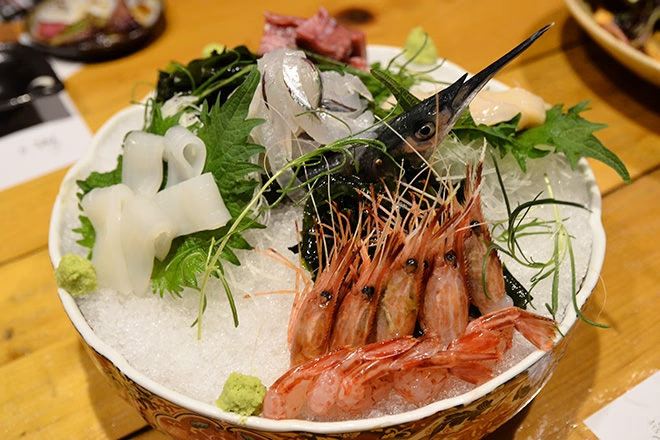
淡水自慢のお刺身!サヨリ・甘エビ・イカ・ホタテ・マグロ。肉厚で脂がのったサヨリが最高です。
あなたの「正しい」はホント?
『自分の中に毒を持て―あなたは“常識人間"を捨てられるか』(紹介者 羽賀 敬祐)
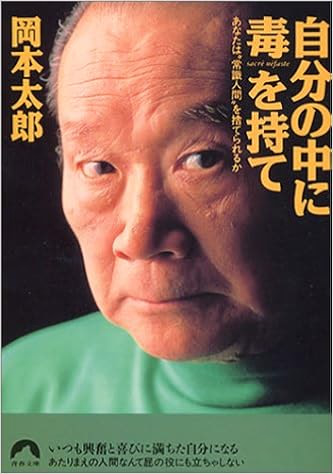
岡本 太郎 (著)『自分の中に毒を持て―あなたは“常識人間"を捨てられるか』青春出版社 (1993/8/1) ( Amazon )
-
 羽賀
羽賀 -
表紙からすごいインパクトの、岡本太郎『自分の中に毒を持て』を持ってきました。初めて読んだのは数年前で、当時は渋谷の壁画や太陽の塔ぐらいしか知らなかったんですが、自分がこれまで生きてきた常識が全部ひっくり返るぐらいの衝撃を受けました。
とにかく太郎節がカッコイイいいんです。たとえば、安全な道と危険な道があれば、ほとんどの人は前者を選ぶけど、太郎さんは必ず危険な道を選ぶと。そっちの方が面白いし、生きていることを実感できると言うんです。自分は石橋を叩くタイプなので、もうグサグサ刺さってきて(笑)。
あと、岡本太郎といえば「芸術は爆発だ」という言葉が有名ですが、その本当の意味も書かれています。一般的に爆発というと、大きな音がして物が飛び散ってというイメージですが、そうじゃないと。本当の爆発というのは、音もしないし物も壊れない、全身全霊が宇宙に向かってパーッとひらくことなんだと。それこそが本来の人の在り方、生き方なんだと言っています。
これまで「正しい」と思ってきたことって、ぜんぶ違ったのかも…。そう思うくらい、書いてあることすべてに揺さぶられる本です。新しい年にピッタリだと思うので、ぜひ読んでみてください。
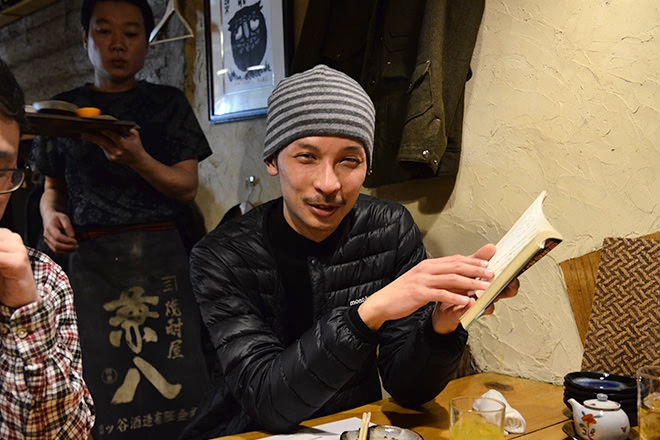
-
 村上
村上 -
タイトルの「毒」って何でしょうか?
-
 羽賀
羽賀 -
みんなが「いい」としてることって本当にいいの?そういう価値観から自分を解き放つ、という意味の毒なのかな。価値観を積み重ねるんじゃなくて「積み減らす」、そうしないと視点が狭まるよと。
-
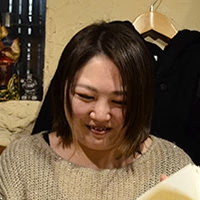 乾
乾 -
常に新しい視点でいるってことですかね。
-
 羽賀
羽賀 -
本の挿絵も太郎さんが書いてるんですが、シンプルで力強くて味がある。青山にある太郎さんの自宅が記念館になってるそうなので、近いうちに行ってみようと思います。
「カキフライ」
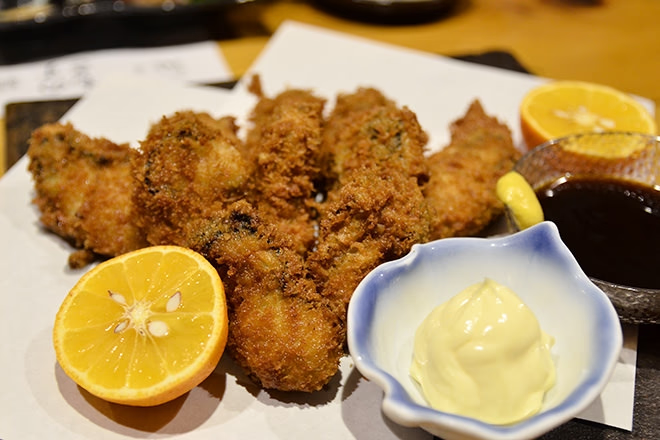
冬といえばコレ!三陸のカキフライに、オレンジ色に完熟した神山すだちを添えていただきます。
許されてる感じがする、ハウツー本
『人生にゆとりを生み出す 知の整理術』(紹介者 村上 伊左夫)

pha (著)『人生にゆとりを生み出す 知の整理術』大和書房 (2017/12/16) ( Amazon )
-
 村上
村上 -
前回 紹介した pha(ファ)さんの新刊です。『人生にゆとりを生み出す 知の整理術』とあるように、ハウツーを紹介した本ですが、ふんわりした文体で書いてあるので読みやすいんです。恩着せがましくないというか、受け入れやすい。pha さんの魅力だと思います。
心の中のモヤモヤしたことを言葉にできるのが本の良さですが、この本もそうですね。人生に関わるような重大なことじゃないけど、ずっと頭の片隅で考えてたことを言葉にしてくれるような気がします。
昨年の新年会では、齋藤孝さんの『読書力』を紹介しましたが、今回の pha さんの本にも読書法や知識の吸収の仕方が書かれているので、また齋藤さんとは違う視点で考えられるといいなと思ってます。
まだ半分ほどしか読んでませんが、本は興味があるとこだけ読んで10冊のうち1〜2冊でも得るものがあればいいとか、勉強するときに大事な4大メソッドとか、ちょっとオタクっぽいネタもあったり、イマドキの視点で書かれてるので、若い人にも読みやすいと思います。
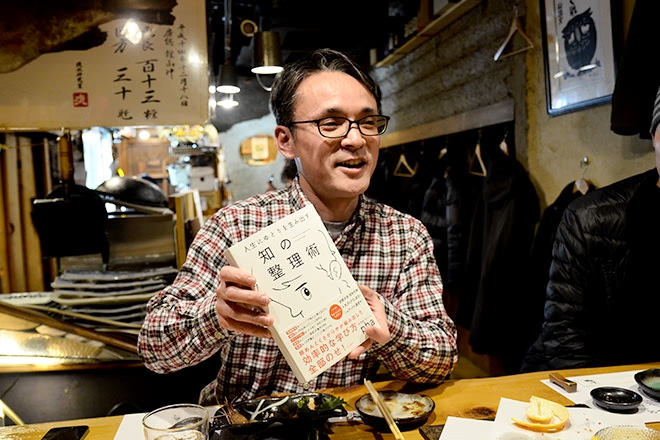
-
 乾
乾 -
挿絵もカワイイですね。
-
 羽賀
羽賀 -
元・日本一有名なニートなんですよね。今は…そうじゃないのかな。
-
 和田
和田 -
Twitter でいつも「ダルい」って言ってる(笑)。
-
 村上
村上 -
なんか許されてる感じというか、自分をダメだって思わなくていいんだなって。仲間がいるような気持ちにさせてくれますよね。
「あん肝ポン酢」
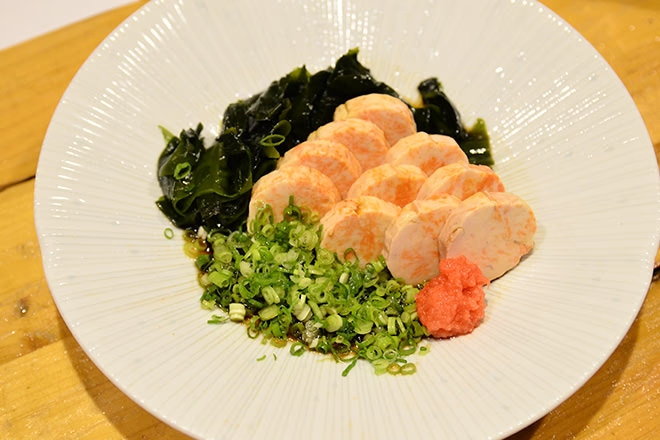
「大人になってわかった美味しさ…」村上が焼酎とともにじっくり味わったあん肝ポン酢
「タラ鍋」
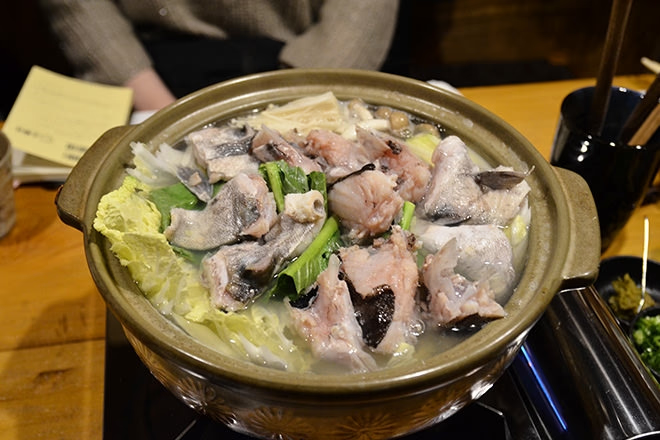
最後のごちそうはタラ鍋。グツグツ煮えるまでじっと見守ります。
哲学的に考える、くらしの技術
『私の生活技術』(紹介者 乾 椰湖)
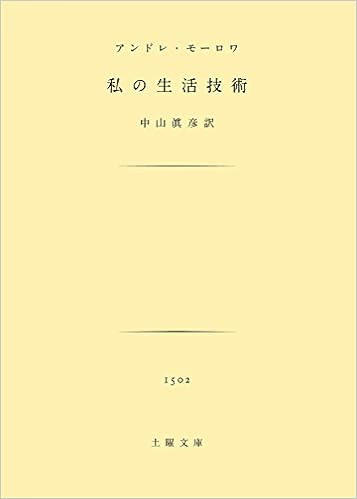
アンドレ・モーロワ (著)『私の生活技術』土曜社 (2016/12/23) ( Amazon )
-
 乾
乾 -
渋谷の SPBS で見つけた アンドレ・モーロワの『私の生活技術』です。著者はフランスの小説家で哲学者アランに師事した人。最近、哲学に興味があって、面白そうだなぁと思って買ってみました。
「1. 考える技術」「2. 愛する技術」「3. 働く技術」「4. 人を指揮する技術」「5. 年をとる技術」という5つの切り口で書かれてます。哲学者の言葉を引用していたり、むずかしい部分も多いので、ボーっと読んでると意味がわからなくなっちゃう。考えながら読まないといけないので、スゴイの買っちゃったなと(笑)。
まだ読み始めたばかりですが、ちょっと紹介すると、考える技術には「体の技術」と「言葉の技術」があると。スポーツ選手は体で考えているとか、大国の指導者はひと言発するだけで戦争が起こせるとか、かつて未開の民族は、言葉に魔法がこもっていると信じていたとか…いろいろ面白いです。
タイトルに「生活技術」とありますが、私ここ数年、ちゃんとした生活をしたいなぁと思っていて。お金を稼ぐとか有名になるとかよりも、自分が気分よく生活することをテーマにしたいなと思っています。そういう意味でもこの本は役立ちそうなので、時間をかけてじっくり読みたいです。
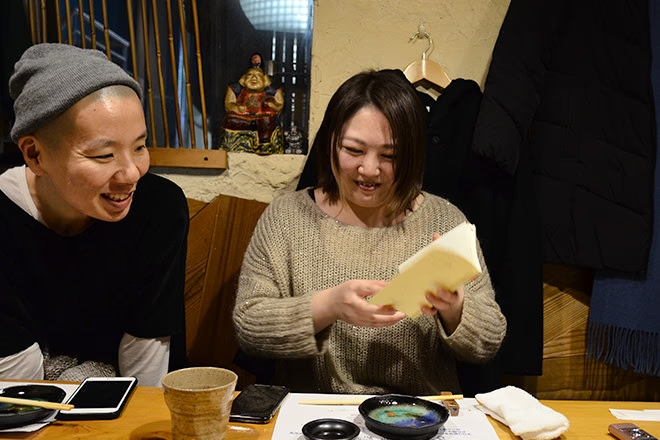
-
 村上
村上 -
なぜ哲学に興味を?
-
 乾
乾 -
なんとなく、哲学と数学がわかるようになりたいなぁと。学生時代も社会学を専攻していて哲学にもちょっと触れてたり。考えることが好きなんです。
-
 和田
和田 -
この本、もともとカバーが無いんですね。装丁が不思議。
-
 乾
乾 -
面白いですよね、土曜社という出版社です。私は本を買ったらカバー外す派なので、ありがたいです。すばらしい(笑)。
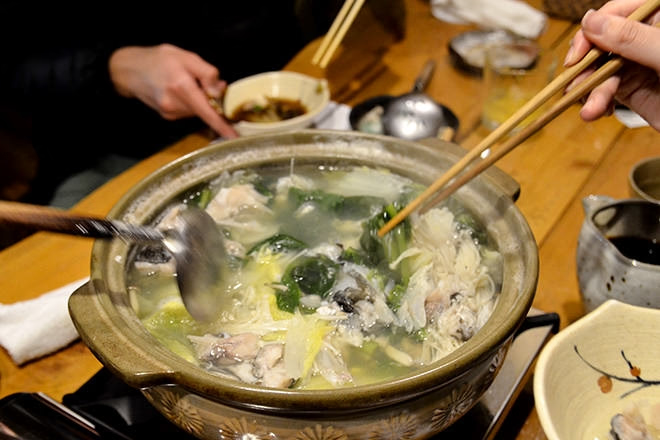
50年ぶりの寒さと言われたこの日。アツアツのお鍋が全身に沁みます。ポン酢と柚子こしょうを添えて。最後はうどんで締めです!
読書会をおえて
鎌倉時代の破天荒な生き方、正しいをひっくり返すパワー、モヤモヤが言葉になる心地よさ、哲学的に生活を考える本。それぞれのチョイスが光る「新しい年に読みたい本」が集まりました。大将の美味しい料理にお腹も心も満たされて、大満足の読書会始めとなりました。
次回はどんなテーマになることやら。それでは、また!
